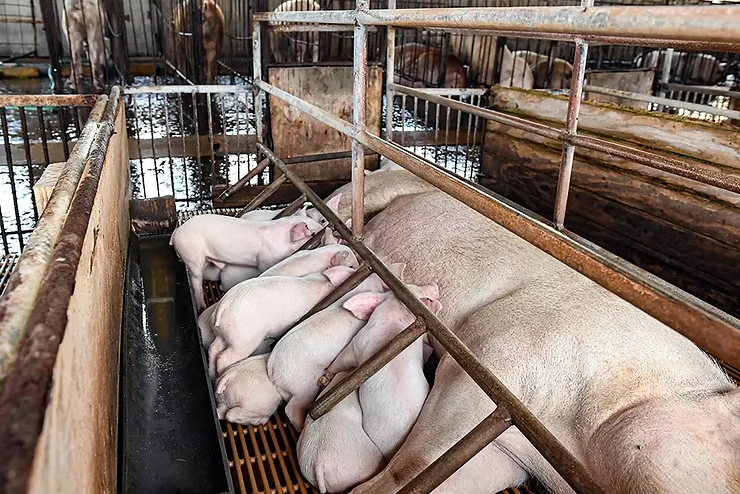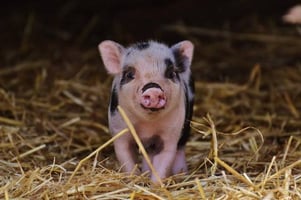Pork producers will watch what happens with new legislation proposed by a Midwest congresswoman...
Call to Action: Address Proposition 12 in Farm Bill

Hog producers have some optimism in their pocket, but one lingering headache is California’s Proposition 12. The National Pork Producers Council (NPPC) and other farm organizations aimed to derail the Proposition from going into effect, taking their arguments to the U.S. Supreme Court.
However, the high court did not rule in pork producers’ favor, instead suggesting that the matter should be taken up through congressional action.
For a refresher, California voters approved Proposition 12 in 2018, which set “humane” housing standards for sows and gilts, as well as for poultry and veal. It not only dictates how California pigs need to be housed, but the order also spells out that any fresh pork to be sold in California also needs to be raised in similar housing standards, regardless of where the pigs are raised.
An Iowa producer wants to sell to California? Meet the standards. Michigan producers want to sell to the Golden State? Meet the requirements. You get the idea.
Some producers have adapted their facilities to suit the desires of Californians, while others converted prior to Proposition 12. For some time now, consumers have said they wish to have more of a say in how their food is being raised, so producers looking to build new barns or remodel existing ones saw the writing on the wall and adapted their facilities.
In the summer of 2023, the Supreme Court ruled that Proposition 12 could go into effect, declaring that the issue should be addressed with Congress.
Now, the NPPC is taking its plea to Congress. In late February and early March, NPPC President Lori Stevermer, a hog producer from Easton, MN, testified in front of the U.S. Senate Committee on Agriculture, Nutrition and Forestry and the U.S. House Agriculture Subcommittee on Livestock, Dairy and Poultry, explaining the main issues on the minds of U.S. hog producers, headlined by Proposition 12.
As has been spelled out before, Californians do not raise a lot of hogs, but they do consume their share of pork, so that market cannot be ignored.
Also, what cannot be ignored is that California is probably the first of other states to pursue such regulations on how livestock should be raised. Such measures are promoted as ensuring animal welfare, when in reality, these referendums are thinly veiled attempts to do away with animal agriculture altogether. Like-minded individuals and groups likely will follow suit if Proposition 12 survives congressional action.
Not only does it have overreaching, arbitrary housing standards, but it also presents inconsistencies in regulations. For example, cooked bacon is legal to be sold in California, but uncooked bacon from the same pig is not legal.
Proposition 12 is only one issue that needs to be addressed in new legislation to prohibit individual states from dictating how producers in other states can raise their animals.
Producers will continue to adopt and renovate their facilities to meet consumers’ demands, but that investment is completely up to the producers themselves. They should not be forced to alter their operations to satisfy the whim of disconnected voters in other states.
It is estimated that it costs 40% to 43% more for producers to build a compliant barn when compared with the widely accepted gestation-stalled barns. In addition to costing producers more, it is estimated that the cost of covered pork products in California increased 20% on average, with pork loins going up as much as 41% after Proposition 12 was implemented.
Congress needs to rework the Farm Bill that U.S. agriculture has been operating under since 2018. A lot has changed in the U.S. and agriculture since that time. The Farm Bill needs to be reworked and not merely extended again.
EDITOR’S TAKE:
Pork producers must appeal to Congress for relief following the 2023 ruling by the U.S. Supreme Court against granting the pork industry relief from California’s Proposition 12. When it was first approved in 2018, the entire ag industry raised concerns about one state being able to set a regulatory standard for the entire nation. Many felt that the commerce clause would override Proposition 12 mandates. Thus, the upcoming Farm Bill legislation seems like a great way to address this contentious issue.
In the meantime, don’t let this issue stop you from contacting pork producers in your area. Be sure to let them know about how they can reduce operating expenses by using AgPack® when they are ready to purchase or lease their next truck. AgPack® can save them over $45,000 through exclusive rebates and discounts on products and services they can use in their operation (if they took advantage of all offers available).







